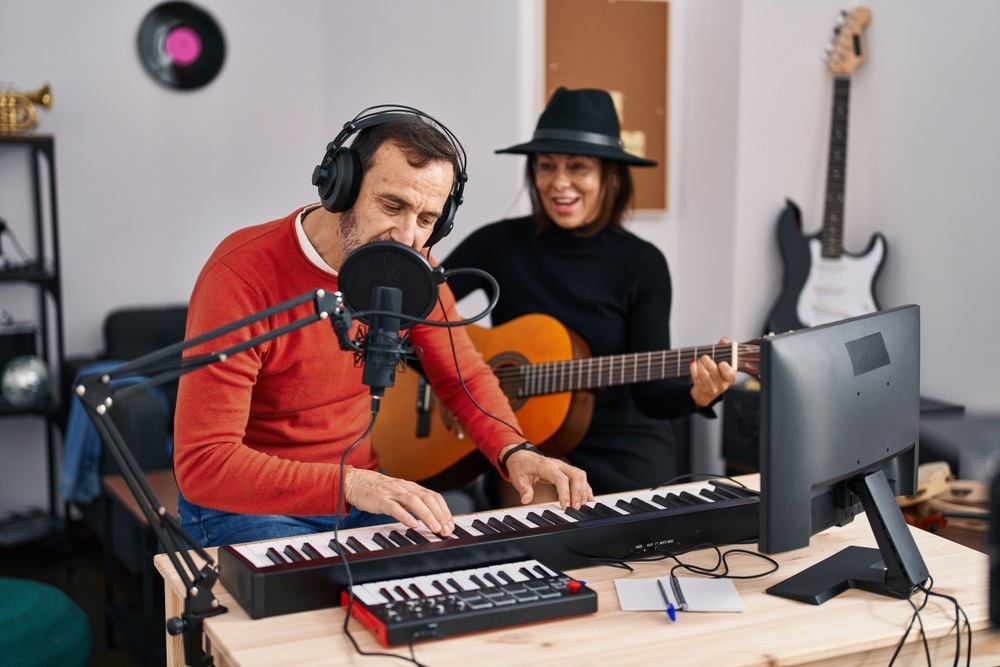
A musician plays a musical instrument, composes or conducts music, sings songs, or performs music live. Musicians express themselves and entertain others through music.
The work of a musician varies greatly depending on factors like musical genre, instrument played, and setting. Musicians may perform solo or as part of an ensemble or band. They may play for live audiences at venues or events, record in studios, or compose original songs and instrumental pieces. Some musicians teach private music lessons or classes.
A musician utilizes musical talent, creativity, technical skills, and performance abilities to produce music that moves, inspires, excites, and captivates listeners. Music is a powerful form of art and self-expression. Musicians aim to connect with audiences and share their love of music. Learn all about the musician job description in this blog post by Jobeling.
Contents
Music Genres
Musicians may play a wide variety of musical genres and styles. Some of the most common genres musicians play include:

Pop
Pop music is a genre that produces popular, chart-topping songs and catchy melodies. Pop artists generally sing over upbeat instrumentation and focus on conventional song structures.
Rock
Rock and roll is known for driving rhythms, amplified electric guitars, powerful drum beats, and passionate vocals. Many rock subgenres include punk, metal, indie, and alternative rock.
Jazz
Jazz is an improvisational genre often characterized by syncopated rhythms, extended chord progressions, and unique instrumental textures from brass, wind, and rhythm sections. Subgenres include swing, bebop, funk, fusion, and contemporary jazz.
Classical
Classical music is Western art music like symphonies, concertos, operas, ballets, and sonatas. It encompasses periods like Baroque, Romantic, and Modern eras with complex compositional techniques.
Country
Country music is influenced by blues and folk, emphasizing stringed instruments like guitar and fiddle. Themes revolve around rural life, with subgenres like bluegrass, honky tonk, and outlaw country.
R&B
Rhythm and blues incorporates jazz, gospel, and blues music elements with catchy melodies and funk instrumentation. Contemporary R&B highlights electronic dance music influences.
Hip Hop
Hip hop focuses on rap lyrics over beats and samples. It began with DJs isolating percussion breaks in funk, soul, and disco songs to create new electronic backing tracks.
Electronic Music
Electronic music covers genres created primarily with electronic instruments, technology, and production techniques. Styles range from house, techno, trance, and dubstep to ambient, industrial, and trip-hop.
World
World music includes traditional and contemporary styles from different countries and cultures. It encompasses diverse genres like flamenco, African drumming, Indian classical music, Latin salsa, and more.
Musicians may choose to specialize in one or multiple genres, expanding the stylistic breadth of their repertoire. Understanding different genres allows musicians to meet demands across diverse live music, recording, and performance settings.
Instruments
Musicians use a variety of instruments to create music.

The most common instruments used by musicians include:
Guitar
This six-stringed instrument can be acoustic, electric, or bass. Guitars are used in nearly every genre of music, from rock, pop, blues, country, folk, and more. Guitarists strum, pluck, and pick the strings to produce chords, melodies, and riffs.
Piano
The piano has black and white keys that correspond to the 12 notes of Western music. Pianists use both hands to play melodies and chords. The piano is versatile across many genres, from classical to jazz to pop.
Drums
A standard drum kit has a bass drum, snare drum, toms, hi-hats, cymbals, and other percussion. Drummers use sticks, mallets, and brushes to hit the various drums and cymbals to establish rhythm, tempo, and song structure. Drums provide the backbone of most popular music.
Violin
This four-stringed, high-pitched instrument is played with a bow. The violin leads melodies in classical, folk, country, and bluegrass. Violins can also play harmony and rhythm.
Saxophone
A versatile woodwind instrument made of brass that is a staple of jazz bands and used in rock, funk, blues, pop, and soul. Saxophonists use reeds and mouthpieces to produce a distinctive tone.
In addition to these popular instruments, musicians may play the trumpet, trombone, clarinet, bassoon, cello, accordion, banjo, harmonica, and many more. Most musicians are proficient in multiple instruments.
Education
As a part of musician job description, formal music education is common for musicians, though only sometimes required.

Many musicians obtain degrees and training from institutions such as:
Music Schools and Conservatories
These schools focus entirely on music education. Programs offer degrees including Bachelor of Music, Master of Music, and Doctor of Musical Arts. Conservatories often specialize in classical music and opera.
Colleges and Universities
Many colleges and universities have music departments offering music degrees. Common options include a Bachelor of Arts in Music and a Bachelor of Music Education for those interested in teaching. Schools may focus on certain genres like jazz.
Arts Schools
Some art schools offer music programs focused on the performance and music production side. This includes crafting original compositions and learning recording skills.
Music degrees cover topics like music theory, music history, ear training, composition, and mastery of one’s chosen instrument(s). Hands-on experience is emphasized through student recitals, concerts, and participation in school ensembles. Aspiring musicians can build their skills and network through their college affiliations.
While degrees demonstrate serious commitment, some musicians skip formal education and develop their abilities through individual practice, bands, private instructors, and innate talent. Advanced education provides helpful training but is only sometimes necessary for success. Experience and perseverance matter greatly, too.
Skills Needed to Become a Musician
To discuss further about the musician job types, a career as a musician requires a diverse set of skills beyond just musical talent. Here are some of the key skills needed to succeed in this field:
Musical Ability
Having natural talent and aptitude for music is important. Musicians need skills like perfect pitch, rhythm, musical expression, and the ability to play an instrument proficiently. Years of practice and dedication to improving technique are essential.
Creativity
Musicians need creativity and imagination to write original compositions and put a unique spin on covers. The ability to improvise and play by ear is also important. Musicians often have to think on their feet and be adaptable.
Passion
A strong passion and love for music is critical. Musicians devote endless hours to practicing and performing. With a true passion for their craft, it is easier to sustain a career in music long-term. An inner drive and relentless work ethic are key.
Discipline
Discipline is required to stick to a regular practice schedule, constantly expand musical skills, and manage the business aspects of being a musician. Setting goals, having time management skills, and being self-motivated are essential discipline traits.
Collaboration
Most musicians must collaborate with others, whether bandmates, producers, or managers. Interpersonal skills and the ability to work as a team is important. Musicians need to communicate constructively, handle criticism, and compromise at times.
Day-to-Day
A musician’s day-to-day activities vary greatly depending on their specialization and whether they are independent or work for an orchestra or band. However, some common tasks and responsibilities include:
- Writing and composing music – Songwriters, composers, and arrangers spend significant time writing original music or making adaptations. This requires creativity, musical knowledge, and dedication.
- Rehearsing – Most musicians must rehearse regularly to prepare for performances and recordings. Rehearsals help refine and polish the music, synchronize with other musicians, and internalize the material.
- Performing – Performances are the culmination of a musician’s work. They may play concerts, recitals, club gigs, private events, sessions, or other shows. Stage presence, endurance, and audience engagement are key.
- Recording – Whether in a professional studio or home setup, recording involves meticulously laying down tracks and getting the best takes. Understanding recording equipment and techniques is important.
- Touring – Musicians who play concerts across multiple cities or countries have to spend time traveling and setting up for gigs. Life on the road can be exciting but tiring.
- Practicing – Consistent practice of scales, techniques, and pieces is essential for all musicians to maintain and improve their skills. Multiple hours of daily practice is common.
The day-to-day activities require diverse creative, technical, business, and interpersonal skills. Musicians must be disciplined, motivated, and constantly working to succeed. An irregular schedule with late nights and weekend work is also common.
Income
A musician’s income can vary greatly depending on genre, fame, and revenue sources.

Here are some typical earning sources and salary ranges:
Salary Ranges
- Unknown musicians may earn $15,000 to $30,000 per year playing small venues and teaching lessons.
- Established musicians with record deals, touring, and merchandise can earn $50,000 to $100,000 annually.
- Famous musicians at the industry’s top can earn millions annually from record sales, streaming royalties, endorsements, and huge world tours.
Revenue Sources
- Record sales – Musicians earn royalties from album and song sales. Ranges are 7% to 14% of the list price for physical sales and around $0.006 to $0.0084 per stream for digital sales. Top artists can earn millions from record sales.
- Streaming royalties – Payouts per stream are small but accumulate with popularity. Top artists can earn millions per year from Spotify and other streaming services.
- Concerts – Touring and live performances are major revenue streams. Concerts earn from ticket sales and a cut of merchandise sold at shows. Top tours can gross over $100 million.
- Merchandise – Musicians earn a cut from all branded merchandise like shirts, hoodies, posters, and other items sold. Merchandise sales at shows and online stores can be very lucrative.
So, musicians have highly variable incomes based on their fame and success, with top artists earning millions from record sales, streaming, touring, and merchandise. But many lesser-known musicians earn modest incomes from smaller venues, teaching, and side jobs.
Challenges
A music career comes with many rewards but has its share of challenges. Some of the most common challenges musicians face include:
- Inconsistent income – Making a reliable living solely from music can be difficult, especially early in your career. Income from performances, royalties, and sales is often sporadic. Supplementing with other work may be necessary at first. Setting aside funds during flush times to cover leaner periods is advisable.
- Self-promotion – Standing out in a crowded industry takes marketing savvy. Musicians must promote themselves and connect with fans. Social media provides useful platforms, but executing an effective strategy requires time and skill. Hiring a publicist is an option, but it can be costly. Most musicians handle their PR, at least initially.
- Gaining exposure – Getting your music heard by a wide audience is crucial for success but extremely difficult. Scoring a record deal or radio airplay gives a major boost, but both are long shots. Musicians often start small, building local buzz by playing venues, sending demos to blogs/stations, and selling at shows. Online platforms like Spotify help, but developing a national fanbase can take years. Persistence is key.
- Non-music tasks – Handling finances, booking gigs, hauling gear, marketing, and other business aspects can distract from creating music. But they’re unavoidable parts of the job. Musicians must learn to juggle business responsibilities and artistic pursuits. Some hire managers to handle the business side, but it’s a significant expense.
A music career is highly competitive and demanding. But it offers immense creative rewards for those willing to work hard and face these challenges head-on. The key is perseverance, adaptability, and always keeping the love of music front and center as your motivation.
Benefits
Being a professional musician offers many rewarding benefits beyond just making music.

Musicians can express their creativity and passion daily. Performing live provides the thrill of connecting with an appreciative audience. Successful musicians often achieve fame and admiration from fans across the world. For many, being a musician is a dream job where they can get paid to do what they love.
Some of the most significant benefits of being a musician include:
- Expressing creativity – Musicians can tap into their creative talents every day. Whether composing original songs, learning covers, or improvising solos, musicianship provides an outlet for creativity. There’s a profound satisfaction in writing a song or mastering an instrument.
- Fame – Popular musicians reach celebrity status with dedicated fans. Signing autographs and seeing crowds sing along at shows provides an adrenaline rush. While fame has downsides, it’s rewarding to gain admirers.
- Connecting with audiences – Performing live allows a visceral connection with listeners. Hearing applause, seeing smiles, and talking with fans after shows is deeply fulfilling. Live music creates a shared emotional experience.
- Fulfilling passion – Many musicians feel they were born to make music. Playing in a band or holding a guitar provides a sense of purpose. Musicians who make a living doing what they love feel truly fortunate. Waking up excited to create music makes for a rewarding career.
Pursuing music as a career allows people to immerse themselves fully in their passion. The path isn’t easy, but achieving success as a musician brings immense fulfillment and joy. Making music for appreciative fans is a lifelong dream come true.
Career Development
A musician’s career can develop in many ways depending on their goals and talents. Here are some common career development paths:
Joining a Band
Many musicians start by joining an existing band as a band member or supporting musician. This allows them to gain experience performing live, recording in the studio, and collaborating creatively.
Joining a successful band can provide greater exposure and opportunities. Musicians should consider whether the band’s genre and style fit their talents and interests.
Auditioning for bands takes dedication to practicing and mastering your instrument. Networking and making connections in the local music scene can lead to auditions.
Working well with others and being a team player is key to getting along with bandmates during gigs, touring, and recording.
Recording Original Music
Musicians interested in songwriting often aim to record their original compositions once they have enough material.
Recording original songs to release as singles or a full album lets musicians express their creativity and share their music with listeners.
Musicians can record DIY in home studios, professional recording studios, or a combination. Learning to produce your recordings takes time.
Decisions have to be made about whether to release music independently or try to get signed by a record label. Label deals provide support but require giving up some control.
Touring
Playing live shows and going on concert tours allows musicians to reach bigger audiences and gain dedicated fans. It’s key for bands seeking fame and popularity.
Touring requires organization, marketing, booking gigs, arranging transportation and lodging, and securing enough finances to fund tours. It’s tiring work with lots of time spent driving away from home.
Tour musicians must solve problems on the fly, deal with equipment issues, and manage health considerations like getting enough rest. Touring develops practical skills.
Musician Job Description FAQ
What Does A Musician Do?
A musician is a professional who performs, composes, or conducts music. They can play one or several instruments, and their work can involve solo performances, playing in bands, orchestras, or smaller groups.
Are There Different Types Of Musicians?
Yes, there are various types of musicians, including instrumentalists, singers, composers, and conductors. They may specialize in different genres like classical, rock, jazz, or pop.
What Skills Are Required To Be A Musician?
Essential skills include musical talent, proficiency in one or more instruments, good hearing, sense of rhythm and pitch, creativity, and often the ability to read music. Interpersonal and marketing skills are also beneficial for career advancement.
What Is The Typical Work Environment For A Musician?
Musicians work in a variety of settings, including concert halls, recording studios, bars, clubs, and event venues. They may also travel frequently for performances.
Conclusion
All musicians need to connect with listeners and build an audience for their music to find success. This could be locally, regionally, nationally, or globally.
Social media, streaming platforms, YouTube, and online marketing help musicians reach new fans. Engaging on platforms and growing an online presence supports careers.
Collaborating and networking with other artists, producers, and industry people also expands a musician’s audience and opportunities.
Staying active, performing live shows, and releasing new music keeps audiences interested and returning for more. An audience is built show by show, song by song.
We hope this article by Jobeling was useful to you. Download our app today to connect with hundreds of musicians and agencies based on your specific preferences.
